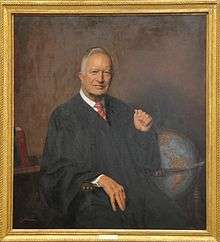Malcolm Richard Wilkey
Malcolm Richard Wilkey (December 6, 1918 – August 15, 2009) was a United States federal judge and ambassador.
Early life and education
Wilkey was born in Murfreesboro, Tennessee and raised in Madisonville, Kentucky.[1] He received an A.B. from Harvard University in 1940, and served in the U.S. Army during World War II in George S. Patton's Third Army from 1941 to 1945 (he left active duty as a Major and served in the U.S. Army Reserve until 1953, when he left as a Lieutenant Colonel). After the war he enrolled in law school and received an LL.B. from Harvard Law School in 1948.
Career
Early career
He was in private practice in Houston, Texas, from 1948 to 1954, also teaching at the University of Houston Law Center from 1949 to 1954.
He entered public service in Texas as the U.S. Attorney for the Southern District of Texas (1954–1958). In 1958 he moved to Washington, D.C., to serve as the U.S. Assistant Attorney General of the Office of Legal Counsel at the Department of Justice (1958–1959), and Assistant Attorney General of the Criminal Division (1959–1961). He returned to private practice in Texas (1961–1963), before moving on to become the General counsel and secretary of Kennecott Copper Corporation (1963–1970), during which he was also a member of the Advisory Panel on International Law for the legal adviser at the U.S. Department of State (1969–1973).
Federal judgeship
Wilkey was nominated by President Richard Nixon on February 16, 1970, for the seat vacated by Warren E. Burger on the U.S. Court of Appeals for the District of Columbia Circuit. He was confirmed by the Senate on February 24, 1970, and received his commission on the following day.
He assumed senior status on December 6, 1984, and his judicial service ended November 8, 1985, when he retired and went to Cambridge University as a visiting fellow of Wolfson College.[2]
Political appointments
In 1989 he was chairman of the President's Commission on Federal Ethics Law Reform and worked alongside his Vice Chairman Griffin B. Bell, who was the U.S. Attorney General under President Jimmy Carter.[3]
President Ronald Reagan appointed him U.S. Ambassador to Uruguay in 1985, and President George H. W. Bush continued him in that post[2] until his retirement in 1990.[4]
In 1992 U.S. Attorney General William P. Barr appointed him to determine whether federal criminal violations had taken place in the House banking scandal.[3]
Personal life
Wilkey married Chilean-born Emma A. Secul Depolo in 1959. He and his wife moved to Santiago, Chile, in 1990. Wilkey died from complications of prostate cancer at his home in Santiago on August 15, 2009.[1][5]
References
- 1 2 3 Schudel, Matt (September 7, 2009). "Malcolm R. Wilkey, 90 - Judge Steered House Check Scandal Probe". Washington Post. Retrieved 2009-09-08.
- 1 2 "George Bush: Continuation of Malcolm Richard Wilkey as Ambassador to Uruguay". May 5, 1989. Retrieved 2009-09-08. John T. Woolley and Gerhard Peters, The American Presidency Project [online]. Santa Barbara, CA: University of California (hosted), Gerhard Peters (database)
- 1 2 Roberts, Robert North; Marion T. Doss Jr (September 1997). From Watergate to Whitewater: The Public Integrity War. Westport, CT: Praeger. pp. 133, 142–143. ISBN 0-275-95597-4. Retrieved 2009-09-08.
- ↑ "George Bush: Nomination of Richard C. Brown To Be United States Ambassador to Uruguay". June 13, 1990. Retrieved 2009-09-08. John T. Woolley and Gerhard Peters, The American Presidency Project [online]. Santa Barbara, CA: University of California (hosted), Gerhard Peters (database)
- ↑ Martin, Douglas (September 18, 2009). "Malcolm Wilkey, 90, Noted Judge, Dies". The New York Times. p. A16.
Writings
- Wilkey, Malcolm Richard (2003). As the twig is bent, or, Did I see the best of America. Philadelphia: Xlibris. ISBN 1-4134-1139-8.
- Wilkey, Malcolm Richard (1995). Roger Clegg, ed. Is it time for a second Constitutional Convention? (Paperback ed.). Washington, D.C.: National Legal Center for the Public Interest. ISBN 0-937299-40-5.
- Wilkey, Malcolm Richard (1982). Enforcing the Fourth Amendment by alternatives to the exclusionary rule. Orrin G. Hatch (introduction). Washington, D.C.: National Legal Center for the Public Interest.
Further reading
- Cain, George H. (Fall 1999). "Malcolm R. Wilkey: Many Robes, Many Hats: A Career Sketch of a Lawyer, Judge and Diplomat". Experience. 10. pp. 18–47.
External links
- Malcolm Richard Wilkey at the Biographical Directory of Federal Judges, a public domain publication of the Federal Judicial Center.
- "Office of the Historian - Department History - People - Malcolm Richard Wilkey". history.state.gov. U.S. Department of State. Retrieved 2009-09-08.
| Legal offices | ||
|---|---|---|
| Preceded by Warren E. Burger |
Judge of the United States Court of Appeals for the District of Columbia Circuit 1970–1985 |
Succeeded by Stephen F. Williams |
| Diplomatic posts | ||
| Preceded by Thomas Aranda, Jr. |
United States Ambassador to Uruguay 1985–1990 |
Succeeded by Richard C. Brown |
